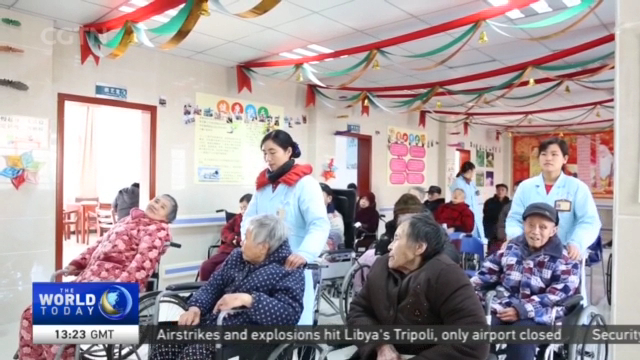
22:42, 21-Apr-2019
Senior Care in China: Authorities preparing for drastic demographic change
Updated
22:40, 24-Apr-2019
03:41

The average age of China's population is rising, and there's a growing sense the country isn't prepared for the economic disruption the demographic changes will bring. Authorities have been looking at possible solutions-one of which is to expand the insufficient network of care systems for senior citizens, and private investment and foreign capital are being welcomed. However, many feel if the issue isn't resolved soon, parents who lived through China's one-child policy could face isolation in their golden years. CGTN's Rory Coen has the story.
China never had to worry about elderly care until recently.
Life expectancy had been hovering around 60 till a couple of decades ago while seniors had traditionally been supported and cared for by their families, rather than it being a public service responsibility.
But times have changed in China.
Fifty-eight-year-old Fan Qingjuan and her husband adhered to the country's one-child policy in the 1980s.
But while she and her siblings cared for their parents, she doesn't expect to have the same support in her old age.
FAN QINGJUAN "My brothers and sisters would take turns to look after my mom. So it was not too much of a burden to me."
China's younger generation are now migrating to the big cities for employment and personal development.
Fan has also moved from her hometown in Shanxi to the Chinese capital to help her only son raise his family.
But she knows it's not a permanent switch.
FAN QINGJUAN "I always want to leave Beijing. I can't relate to anything here. I will go back to my hometown when my grandson grows up."
Which begs the question, who will take care of her there?
China's limited elderly-care system has been primarily supported by public funds as part of seniors' basic social welfare needs.
Those with physical challenges or with no income or family have been prioritized.
However, the government has recognized the limitations and is now looking to develop a much more comprehensive system.
SUN YINGJIE, SECRETARY CHINA-ASIA ELDERLY SERVICE INDUSTRY COMMITTEE "Either the public, or the private ones, need to improve on their quality of service. The government is also inviting private and even foreign companies to help operate those government-funded senior care centers. This would provide higher-quality services for elders."
But such are China's long-held traditions, not everyone is keen on the idea of institutionalized elderly care.
FAN QINGJUAN "I prefer to age at home. I don't trust organizations."
Since 2016, Australian companies have been putting on regular road-shows in major Chinese cities, promoting their elderly care services.
One program provides professional home-care training to the workers in the sector.
TIM WHITE, TRADE COMMISSIONER AUSTRALIAN TRADE AND INVESTMENT COMMISSION "As we understand there are around one million workers in China's aged care sector. Many of them are seeking formal qualifications. So on this mission, we will be seeking to connect some of the Australian leading aged care training and education providers with local potential commercial business partners, with industry associations and of course importantly, with government and policy makers to explore potential future partnerships."
Taking care of one's parents used to be considered exercising "filial obedience" in Chinese society.
But as China continues to develop and modernize, maintaining such a tradition seems impractical and inefficient.
But as Fan says, she'll be happy if her son and his family can visit her every now and again.
Rory Coen, CGTN.

SITEMAP
Copyright © 2018 CGTN. Beijing ICP prepared NO.16065310-3
Copyright © 2018 CGTN. Beijing ICP prepared NO.16065310-3